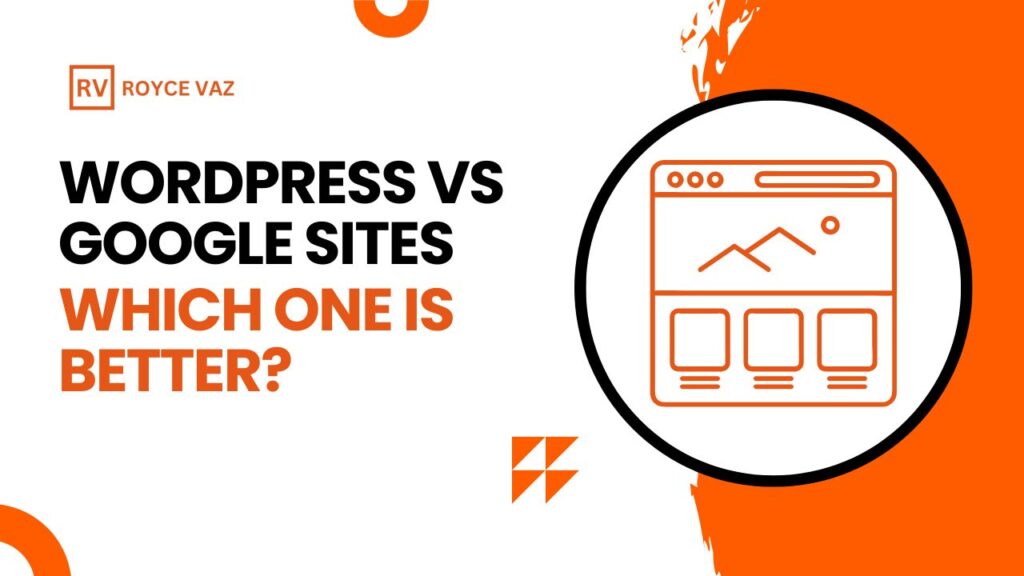When it comes to building a website, both WordPress and Google Sites are popular platforms—but they serve very different purposes. Choosing the right one depends on your goals, technical skills, and the type of website you want to create. In this comparison, we’ll break down the key differences to help you decide which is better for your needs.

1. Ease of Use
Google Sites:
Google Sites is designed for simplicity. Anyone can create a basic website without any coding knowledge. The drag-and-drop interface is straightforward, and setup is almost instant. It’s ideal for internal company sites, school projects, portfolios, or simple informational pages.
WordPress:
WordPress offers more control but comes with a steeper learning curve. While WordPress.com simplifies things with a hosted version, WordPress.org gives you full control but requires you to set up hosting, choose a theme, and manage plugins.
Winner: Google Sites (for beginners with no technical background)
2. Design and Customization
Google Sites:
Customization is limited. You can choose basic layouts, change fonts, and insert images or YouTube videos, but you’re confined to the few templates Google provides. You won’t find advanced design flexibility.
WordPress:
WordPress wins hands down here. Thousands of free and premium themes are available, along with powerful customization options. You can build anything from blogs and business websites to e-commerce stores, all styled exactly how you want.
Winner: WordPress
3. Features and Functionality
Google Sites:
Google Sites focuses on simplicity over features. It integrates well with other Google Workspace apps like Docs, Drive, Calendar, and Slides. However, you won’t find features like SEO tools, membership plugins, or e-commerce capabilities.
WordPress:
WordPress is open-source and supported by a massive ecosystem of plugins—over 60,000 of them. Whether you need SEO optimization, contact forms, analytics, backups, or online store functionality, WordPress has you covered.
Winner: WordPress
4. SEO Capabilities
Google Sites:
SEO features are minimal. You can set page titles and descriptions, but that’s about it. There’s little control over indexing, sitemaps, or technical SEO practices.
WordPress:
WordPress excels at SEO. You can use plugins like Yoast SEO or Rank Math to optimize every aspect of your site—from on-page SEO to schema markup and XML sitemaps.
Winner: WordPress
5. Hosting and Ownership
Google Sites:
Google hosts your site for free, but you don’t have full control. You’re bound by Google’s terms and platform limits. It’s not ideal for long-term, large-scale projects.
WordPress:
With WordPress.org, you choose your hosting provider and own your content. You have full control over the site and can move it anywhere. WordPress.com offers a hosted option with limitations that can be lifted by upgrading plans.
Winner: WordPress
6. Scalability
Google Sites:
Best for small, simple sites. It’s not built to scale. If your business or project grows, you’ll quickly outgrow Google Sites.
WordPress:
WordPress scales easily. Whether you’re starting a blog or building a complex web app, WordPress can handle it with the right setup.
Winner: WordPress
7. Cost
Google Sites:
Free. You don’t pay for hosting or domain (unless you want a custom domain). This makes it great for small teams, nonprofits, or student projects.
WordPress:
WordPress software is free, but you’ll pay for hosting, domains, premium themes, or plugins depending on your needs. Basic sites can cost as little as $3–$10/month, while advanced ones can be more.
Winner: Google Sites (for budget users)
8. Security and Maintenance
Google Sites:
Google handles all security and updates. There’s no need to worry about backups or plugin conflicts.
WordPress:
You’re responsible for updates, backups, and security unless you’re using a managed hosting provider. However, there are many tools to simplify this.
Winner: Google Sites (for hands-off users)
Final Verdict: Which One Should You Choose?
| Use Case | Recommended Platform |
|---|---|
| Personal website or portfolio | Google Sites |
| School or internal project | Google Sites |
| Business website | WordPress |
| Blogging | WordPress |
| E-commerce | WordPress |
| SEO-focused site | WordPress |
| Advanced customization needs | WordPress |
| Quick, free, no-maintenance site | Google Sites |
If you want a professional-looking website with full control, WordPress is better in almost every way. But if you’re looking for a quick, no-frills solution for a simple project, Google Sites is the fastest way to get started.

